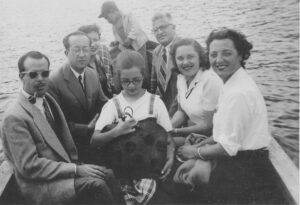Thich Nhat Hanh read my soul when he said, riffing on Descartes, “I think; therefore, I am not here.” That’s me, to the core. I am almost never here. I am usually deep in my frontal lobes, executive functions in full swing, composing scenarios of what might happen later today or ten years from now and figuring out what to do about it.
I have always been this way. As an only child surrounded by a tribe of well-meaning adults, I was taken on endless visits, walks, and shopping expeditions. When I complained, my father would say, “Think! An intelligent person is never bored.” So I learned to escape boredom by retreating into a world of my own. Since then, I have learned to pay just enough attention to survive, but most of the time I am still not here in the present, but in the future or, more and more now, in the past. Not paying attention, and envying and marveling at those who do.
Great writers are attention virtuosos. Take for instance Anne Tyler, who in one of her novels describes the moment when, driving in a downpour, you go under an overpass and the noise suddenly stops, and starts again when you come out. Or take Colette, recalling the two musical notes produced by the rusty iron gate of her mother’s garden. Or Mary Oliver, noticing in The Summer Day that the grasshopper moves her jaws back and forth while eating, instead of up and down. Mary Oliver, who said, “Instructions for living a life. Pay attention. Be astonished. Tell about it.”
I don’t know when paying attention started getting so much attention. For most of my life I assumed that it was perfectly o.k. to lead an inward existence, to dwell almost exclusively in the attic of my body, under the roof of my skull. Wasn’t that where all the good stuff was?
Apparently not. Now wherever I turn, I am being exhorted to pay attention, to be here now.
Mary Oliver again: “To pay attention, this is our endless and proper task.”
Simone Weil: “Attention is the rarest and purest form of generosity […] attention, taken to its highest degree, is the same thing as prayer.”
Thich Nhat Hanh: “The present moment is filled with joy and happiness. If you are attentive, you will see it.”
Eckart Tolle: “When your attention moves into the Now, there is an alertness. It is as if you are waking from the dream of thought, the dream of past and future. Such clarity, such simplicity.”
Joy! Happiness! Clarity! Simplicity! What wouldn’t I give for just five minutes of one of those? But it’s as if I had an elevator inside my body, and no matter what buttons I push, it keeps zooming up to the top floor, and getting stuck there.
I tell you who I think is the real culprit here: language. In my head there is a perpetual motion machine, and all it does is generate words, sentences, and paragraphs, day and night, making up stories, exclaiming and lamenting, imagining conversations, countering arguments, reshaping the past, arranging the future. Keeping me from paying attention.
Still, I try, just like I try during meditation to quiet the chatter and return to stillness. Learning to pay attention is a lot like meditation: an endless round of trying and failing, trying and failing, and trying again. And sometimes, for just an instant, getting it.
I took a walk at dusk the other day, while the hermit thrush was giving a recital in the woods. I always feel that, when a thrush is singing, I should not walk away until he’s done, that to leave would be as rude as leaving in the middle of a concert. So I was standing there listening and I realized that this particular bird, unlike its fellow thrushes, had inserted two grace notes at the end of his song. And as I waited for the next stanza I opened my eyes and saw that the field was dotted with buttercups–my favorite wildflower, with its softly cupped corolla, and its petals as shiny as porcelain. I stood there and listened to the bird and gazed at the flower and for a minute or so I was only eyes and ears. There were no words, and I was all there.



4 Responses
Sometimes you’re forced to pay attention.
I’m watching what is probably a single KU reader proceed through NETHERWORLD. At a certain time of day it updates, and 14 days in a row this reader has stopped at about a scene’s worth number of pages: 5, 6, 5, 4, 2…
That means reading a bit and then stopping – I can’t do that. Either I keep reading – or I give up.
That also means a single reader taking small bites is all I have coaxed to read the whole month. I make use of what I have, not what I want.
Not sure what a KU reader is?
Lali: So right on and personal to me. The reflection of your twilight walk evoked the heart of your message…be here…now. Thank you.
Thanks for reading, Janice. Have you been hearing the thrushes around your house?